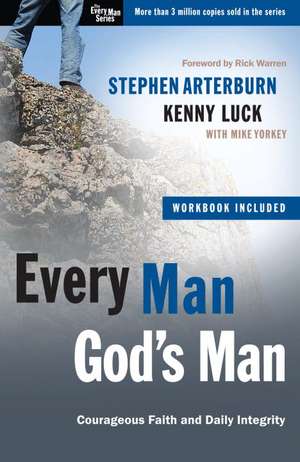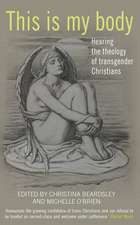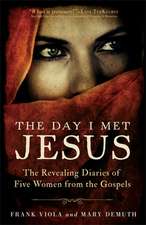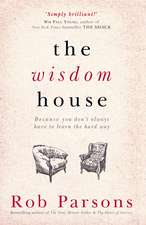Every Man, God's Man: Every Man's Guide To...Courageous Faith and Daily Integrity: Every Man
Autor Stephen Arterburnen Limba Engleză Paperback – 31 mar 2011
-From the foreword by Rick Warren, author of The Purpose Driven Life
How to be a man after God's own heart—relentlessly.
You are about to discover life-changing encouragement and practical, man-to-man guidance in your Christian walk.
Every Man, God’s Man is tailor-made for any man who may feel incomplete in his commitment to God. It’s for the man who wants to become even more authentic, more courageous, more intimate with God in every area of his life. It’s for every man who desires to walk in true spiritual integrity every moment of every day.
Like other books in the best-selling Every Man series, Every Man, God’s Man boldy gets into your head, gives you hope, and equips you to persevere in your individual pursuit of God.
Includes a comprehensive workbook for individual and group study.
Preț: 119.15 lei
Nou
Puncte Express: 179
Preț estimativ în valută:
22.80€ • 23.76$ • 18.88£
22.80€ • 23.76$ • 18.88£
Carte disponibilă
Livrare economică 13-27 martie
Preluare comenzi: 021 569.72.76
Specificații
ISBN-13: 9780307729507
ISBN-10: 0307729508
Pagini: 320
Dimensiuni: 132 x 203 x 18 mm
Greutate: 0.25 kg
Editura: Waterbrook Press
Seria Every Man
ISBN-10: 0307729508
Pagini: 320
Dimensiuni: 132 x 203 x 18 mm
Greutate: 0.25 kg
Editura: Waterbrook Press
Seria Every Man
Recenzii
Praise for Every Man, God’s Man
“If you’ll read with a humble and open heart, Every Man, God’s Man will make you uncomfortable, inspire you to positive change, and get you pumped about taking new risks in your faith.”
—RICK WARREN, author of The Purpose-Driven Life and senior pastor of Saddleback Church
“I have high regard for Stephen Arterburn and Kenny Luck and their positive message to men. Every man who wants to become all God created him to be will benefit from Steve and Kenny’s counsel.”
—JOSH MCDOWELL, best-selling author and speaker
“Stephen Arterburn and Kenny Luck have captured the bold message men want and need to hear today. Every Man, God’s Man speaks the language of men, urging them toward a new dimension of authentic faith and revealing the key principles they need to be God’s man in every area of their lives.”
—FISHER DEBERRY, former head football coach, U.S. Air Force Academy
“Every Man, God’s Man holds a life-changing message for men. I applaud Arterburn and Luck for their efforts to challenge men in their pursuit of God and living godly lives. Everyman needs to read and apply these truths.”
—DAN QUAYLE, former vice president and author of Standing Firm
“If you’ll read with a humble and open heart, Every Man, God’s Man will make you uncomfortable, inspire you to positive change, and get you pumped about taking new risks in your faith.”
—RICK WARREN, author of The Purpose-Driven Life and senior pastor of Saddleback Church
“I have high regard for Stephen Arterburn and Kenny Luck and their positive message to men. Every man who wants to become all God created him to be will benefit from Steve and Kenny’s counsel.”
—JOSH MCDOWELL, best-selling author and speaker
“Stephen Arterburn and Kenny Luck have captured the bold message men want and need to hear today. Every Man, God’s Man speaks the language of men, urging them toward a new dimension of authentic faith and revealing the key principles they need to be God’s man in every area of their lives.”
—FISHER DEBERRY, former head football coach, U.S. Air Force Academy
“Every Man, God’s Man holds a life-changing message for men. I applaud Arterburn and Luck for their efforts to challenge men in their pursuit of God and living godly lives. Everyman needs to read and apply these truths.”
—DAN QUAYLE, former vice president and author of Standing Firm
Notă biografică
Stephen Arterburn is the founder and chairman of New Life Ministries, America's largest faith-based broadcast, counselling, and treatment ministry, and is the host of New Life Live!- a daily radio program heard on more than 180 radio stations nationwide. He has been featured in publications such as The New York Times, USA Today, and TIME magazine. Arterburn is also the founder of the 'Women of Faith' conferences and has written over 60 books, including the best-selling Every Man's series. He has been nominated for writing awards and has won three Gold Medallion awards. Arterburn is a well-known public speaker and in August 2000 was inducted into the National Speakers Association's Hall of Fame. He lives with his family in Laguna Beach, California. Some of his published works include Transformation, Finding Mr Right, Control what is controlling you, Boiling Point and NLT Every Man's Bible. - Editorial Review. Kenny Luck is president and founder of Every Man Ministries, coauthor of the best-selling Every Man, God's Man and the author of the first book in the God's Man series, Risk which will have a sequel Dream. He is the Men's Pastor of Saddleback Church in Lake Forest, California. He and his wife, Chrissy, have three children and reside in Trabuco Canyon, California.
Extras
Please forgive me for not starting off this book with a superstud football story or some other macho-inspired anecdote as men’s books are supposed to do. In fact, I’m going to do a “Wrong-Way Riegels” and run in the opposite direction by sharing a shameful antifootball story that happened to me. (By the way, Wrong-Way Riegels was Roy Riegels, a defensive back who recovered a fumble in the 1929 Rose Bowl game and scampered sixty-five yards in the wrong direction before being tackled by a teammate!)
My story begins on a dusty, hardscrabble high-school football field in Bryan, Texas, where I hated almost every sweat-producing minute of every bone-crunching practice, none of which produced victories, because our sorry team lost nearly every game. I can still taste the dirt in my mouth from that grassless practice field. I can still feel my heaving breaths under thirty pounds of equipment, a flannel practice jersey, and humidity so thick that it cut the oxygen content by 50 percent.
Yes, you heard me right. I hated playing football, even if it was inTexas, where high-school football is a state religion and players have streets named after them.
There, I’ve said it. In other books, I have confessed to a promiscuous life and even to paying for an abortion, but that was easy compared to what I just did—admitting that I hated playing football. What a stupid sport!
Looking back, I wish I’d been a thespian on the high-school drama team. (That means I wanted to be an actor, for those of you who live in Rio Linda.) I say this even though my football prowess once made headlines on the sports pages of the Bryan Daily Eagle. I even have a dog-eared article in my scrapbook that says I might have been the best running back ever to set foot in Bronco Stadium.
My inauspicious football career began late in my sophomore year at Stephen F. Austin High School, home of the Broncos, when my head coach had the brilliant idea during spring practice of moving me from center to fullback. I weighed 210 pounds, most of which was baby fat, but I was fast on my feet. I welcomed Coach’s decision because the allure of bending over, hiking the ball to someone’s hands between my legs, and then blocking an oversized nose guard who was fully committed to knocking me on my rear end had lost some of its luster, if you catch my drift.
At the end of spring practice, we played the annual Green-White Game, an intrasquad contest held every April when the weather was already too hot for walking a dog.We played for the sole reason that people in Texas could not wait until September to witness a real football game. Even the women were anxious to get back up in those stands and yell. It must have been the only safe place for some of them to do that. My first Green-White football game was staged on a searing Friday night in Bronco Stadium. For most of the game, I lined up behind the quarterback as the fullback. When the ball was snapped, my job was to run into the line, faking that I had the ball. Throughout the first three quarters, I ducked my head and plowed into the line; instead of actually blocking someone, I would fall into a heap and hope I tripped somebody. I soon became an expert at this hunch-drop-and-roll kind of thing.
What a pitiful sight I must have been! Rather than making a crushing block and punching a hole for the halfback to run through, I pretty much performed a pratfall into the line.Thismade perfect sense, since I was a guy who avoided pain at all costs.
Then, late in the game, the unexpected happened. Instead of being cannon fodder as I had been for the previous forty plays, I would get to run the ball! The play called for me to take the handoff, burst through a roadblock filled with musclebound linemen, cut to the outside of the linebackers, and sprint for the goal line. At least that is how the plan was drawn up. More likely, I would be stuffed at the line of scrimmage and find myself at the bottom of a humongous dog pile, gasping for breath.
We were on our own thirty-yard line, which means we were seventy yards from the end zone. After hearing the quarterback announce the play, I envisioned myself running up to the line and falling over in a hunchedup fetal position while cradling the ball. I could just hear the announcer laughing over the public address system and saying something like, “Handoff to Arterburn…Ooh, he didn’t get very far, did he?”
I don’t remember much of what Coach said, but I do remember his using the word pathetic at least ten times.
The ball was snapped. I shot out of my three-point stance behind the quarterback because the only thing faster than my legs was the beating of my heart. I opened up my folded arms. The quarterback slid the ball inside, and I headed toward the meat packers from the local processing plant, now posing as guards, tackles, nose guards, and linebackers. Then the strangest thing happened: A gap opened up in the wall. I shot through the hole, and once I was beyond the line of scrimmage, I nearly dropped the ball in disbelief.
I had some daylight. I cut to the outside, and now it was a footrace between me and cornerback Billy Davis—the fastest player on the team. There was no way I could outrun Billy. When he caught up with me, I stiff-armed himlike a junior Emmitt Smith and pushed himto the ground. I couldn’t believe it. I ran for my life. He’s down to the thirty, the twenty, the ten…He’s going to go all…the…way! Touchdown!
I was delirious with joy until my teammates tackled me in the end zone. I struggled to regain my footing, and then they all slapped me on my helmet. That hurt! I heard the unrestrained cheers of the huge crowd, and the following day, the local sports scribe called me the “Bronco Bruiser Express,” a player destined to become the greatest running back to ever play on Bronco Field.
The hubbub continued right up to the start of the fall season. People in Bryan who depended on football—and I would have to say that included nearly every man, woman, and child—were depending on me, the running back who hated football and wanted to quit, quit, quit. I think I felt that way because Coach never let an opportunity go by to call me the dumbest-looking excuse for a football player, someone who flopped into the line with no conviction and produced a fluke, once-in-alifetime seventy-yard run for a touchdown. When Coach reviewed the game film with me, I don’t remember much of what he said, but I do remember his using the word pathetic at least ten times.
Then the season started. When you run with the football, it is only a matter of time before someone hits you hard very close to a vital organ. In our season opener, I was carrying the ball when I was nailed—and my left kidney felt as if it would split open. The trainer taped me up and pushed me back onto the field. A few plays later, I took a shot to the shoulder, which displaced some cartilage. The trainer taped me up and pushed me back onto the field. Soon I took a direct hit to the ribs, one that caused the womenfolk with the beehive hairdos in Section 18 to wince. I was the
Bronco Bruiser, all right, except I was the one getting bruised.
That pretty much sums up my horrible junior year, which was matched by another injury-prone effort during my senior year. For more than two years, I devoted hours and hours to a game that I hated, developing skills I would never use again. One of the happiest days of my life was when the football season ended and I traded in my uniform for a letterman’s jacket with a big B on it. The B didn’t stand for “Bronc,” but for “Bruised.”
Thank you for listening as I unburdened myself regarding high-school football. For a guy like me to endure that kind of daily struggle, there must have been a strong reason I was willing to do so. And there was. The reason I played is because in Texas, you either played football or you were gay. My manhood depended on it. (Well, if you didn’t play football, it didn’t actually mean you were gay, but everybody thought you were.) I wanted to be seen as a man, and I would not allow my manhood to be shortchanged by not playing on that team. So I stayed until the bitter end and proved to those fans in Bronco Stadium that I was a man.
I look back on those days with regret, however. I would have been a lot happier joining the Thespian Society and auditioning for a role in a school play. And they practiced in an air-conditioned hall! Football was such a waste of time.
Now that I have confessed this lunacy to you, I wonder if you have ever stopped to think about some of the stuff you’ve done in the past just to prove to yourself or others that you are a real man. Some pursue a certain career or sexual conquests or sex with themselves, and they hate themselves for it. With each surge of success or pleasure, however, it is an empty soul that proclaims, “I am a man.”
We men have some weird ways of proving our manhood, but that’s because we have some strange ideas of what it means to be a man. Many of us did not have fathers who took us by the hand, and later stood shoulder to shoulder, to show us the way of the world. Many of us never had a dad acknowledge our manhood, which means we have been locked in a desperate search for someone, or something, that would acknowledge it.
Therein lies the problem. We spend our lives doing stupid stuff to try to fit in, prove ourselves in the heat of battle, or show off our abilities. Our focus is on what other guys think, whoever they are. My contention is that we are playing to the wrong audience. God Almighty is the only audience we need, and He’s not nearly as fickle as those football fans who filled Bronco Stadium three decades ago. When we play for God, we become God’s man. It’s His jersey, His team we’re playing for.
And He has our number.
My story begins on a dusty, hardscrabble high-school football field in Bryan, Texas, where I hated almost every sweat-producing minute of every bone-crunching practice, none of which produced victories, because our sorry team lost nearly every game. I can still taste the dirt in my mouth from that grassless practice field. I can still feel my heaving breaths under thirty pounds of equipment, a flannel practice jersey, and humidity so thick that it cut the oxygen content by 50 percent.
Yes, you heard me right. I hated playing football, even if it was inTexas, where high-school football is a state religion and players have streets named after them.
There, I’ve said it. In other books, I have confessed to a promiscuous life and even to paying for an abortion, but that was easy compared to what I just did—admitting that I hated playing football. What a stupid sport!
Looking back, I wish I’d been a thespian on the high-school drama team. (That means I wanted to be an actor, for those of you who live in Rio Linda.) I say this even though my football prowess once made headlines on the sports pages of the Bryan Daily Eagle. I even have a dog-eared article in my scrapbook that says I might have been the best running back ever to set foot in Bronco Stadium.
My inauspicious football career began late in my sophomore year at Stephen F. Austin High School, home of the Broncos, when my head coach had the brilliant idea during spring practice of moving me from center to fullback. I weighed 210 pounds, most of which was baby fat, but I was fast on my feet. I welcomed Coach’s decision because the allure of bending over, hiking the ball to someone’s hands between my legs, and then blocking an oversized nose guard who was fully committed to knocking me on my rear end had lost some of its luster, if you catch my drift.
At the end of spring practice, we played the annual Green-White Game, an intrasquad contest held every April when the weather was already too hot for walking a dog.We played for the sole reason that people in Texas could not wait until September to witness a real football game. Even the women were anxious to get back up in those stands and yell. It must have been the only safe place for some of them to do that. My first Green-White football game was staged on a searing Friday night in Bronco Stadium. For most of the game, I lined up behind the quarterback as the fullback. When the ball was snapped, my job was to run into the line, faking that I had the ball. Throughout the first three quarters, I ducked my head and plowed into the line; instead of actually blocking someone, I would fall into a heap and hope I tripped somebody. I soon became an expert at this hunch-drop-and-roll kind of thing.
What a pitiful sight I must have been! Rather than making a crushing block and punching a hole for the halfback to run through, I pretty much performed a pratfall into the line.Thismade perfect sense, since I was a guy who avoided pain at all costs.
Then, late in the game, the unexpected happened. Instead of being cannon fodder as I had been for the previous forty plays, I would get to run the ball! The play called for me to take the handoff, burst through a roadblock filled with musclebound linemen, cut to the outside of the linebackers, and sprint for the goal line. At least that is how the plan was drawn up. More likely, I would be stuffed at the line of scrimmage and find myself at the bottom of a humongous dog pile, gasping for breath.
We were on our own thirty-yard line, which means we were seventy yards from the end zone. After hearing the quarterback announce the play, I envisioned myself running up to the line and falling over in a hunchedup fetal position while cradling the ball. I could just hear the announcer laughing over the public address system and saying something like, “Handoff to Arterburn…Ooh, he didn’t get very far, did he?”
I don’t remember much of what Coach said, but I do remember his using the word pathetic at least ten times.
The ball was snapped. I shot out of my three-point stance behind the quarterback because the only thing faster than my legs was the beating of my heart. I opened up my folded arms. The quarterback slid the ball inside, and I headed toward the meat packers from the local processing plant, now posing as guards, tackles, nose guards, and linebackers. Then the strangest thing happened: A gap opened up in the wall. I shot through the hole, and once I was beyond the line of scrimmage, I nearly dropped the ball in disbelief.
I had some daylight. I cut to the outside, and now it was a footrace between me and cornerback Billy Davis—the fastest player on the team. There was no way I could outrun Billy. When he caught up with me, I stiff-armed himlike a junior Emmitt Smith and pushed himto the ground. I couldn’t believe it. I ran for my life. He’s down to the thirty, the twenty, the ten…He’s going to go all…the…way! Touchdown!
I was delirious with joy until my teammates tackled me in the end zone. I struggled to regain my footing, and then they all slapped me on my helmet. That hurt! I heard the unrestrained cheers of the huge crowd, and the following day, the local sports scribe called me the “Bronco Bruiser Express,” a player destined to become the greatest running back to ever play on Bronco Field.
The hubbub continued right up to the start of the fall season. People in Bryan who depended on football—and I would have to say that included nearly every man, woman, and child—were depending on me, the running back who hated football and wanted to quit, quit, quit. I think I felt that way because Coach never let an opportunity go by to call me the dumbest-looking excuse for a football player, someone who flopped into the line with no conviction and produced a fluke, once-in-alifetime seventy-yard run for a touchdown. When Coach reviewed the game film with me, I don’t remember much of what he said, but I do remember his using the word pathetic at least ten times.
Then the season started. When you run with the football, it is only a matter of time before someone hits you hard very close to a vital organ. In our season opener, I was carrying the ball when I was nailed—and my left kidney felt as if it would split open. The trainer taped me up and pushed me back onto the field. A few plays later, I took a shot to the shoulder, which displaced some cartilage. The trainer taped me up and pushed me back onto the field. Soon I took a direct hit to the ribs, one that caused the womenfolk with the beehive hairdos in Section 18 to wince. I was the
Bronco Bruiser, all right, except I was the one getting bruised.
That pretty much sums up my horrible junior year, which was matched by another injury-prone effort during my senior year. For more than two years, I devoted hours and hours to a game that I hated, developing skills I would never use again. One of the happiest days of my life was when the football season ended and I traded in my uniform for a letterman’s jacket with a big B on it. The B didn’t stand for “Bronc,” but for “Bruised.”
Thank you for listening as I unburdened myself regarding high-school football. For a guy like me to endure that kind of daily struggle, there must have been a strong reason I was willing to do so. And there was. The reason I played is because in Texas, you either played football or you were gay. My manhood depended on it. (Well, if you didn’t play football, it didn’t actually mean you were gay, but everybody thought you were.) I wanted to be seen as a man, and I would not allow my manhood to be shortchanged by not playing on that team. So I stayed until the bitter end and proved to those fans in Bronco Stadium that I was a man.
I look back on those days with regret, however. I would have been a lot happier joining the Thespian Society and auditioning for a role in a school play. And they practiced in an air-conditioned hall! Football was such a waste of time.
Now that I have confessed this lunacy to you, I wonder if you have ever stopped to think about some of the stuff you’ve done in the past just to prove to yourself or others that you are a real man. Some pursue a certain career or sexual conquests or sex with themselves, and they hate themselves for it. With each surge of success or pleasure, however, it is an empty soul that proclaims, “I am a man.”
We men have some weird ways of proving our manhood, but that’s because we have some strange ideas of what it means to be a man. Many of us did not have fathers who took us by the hand, and later stood shoulder to shoulder, to show us the way of the world. Many of us never had a dad acknowledge our manhood, which means we have been locked in a desperate search for someone, or something, that would acknowledge it.
Therein lies the problem. We spend our lives doing stupid stuff to try to fit in, prove ourselves in the heat of battle, or show off our abilities. Our focus is on what other guys think, whoever they are. My contention is that we are playing to the wrong audience. God Almighty is the only audience we need, and He’s not nearly as fickle as those football fans who filled Bronco Stadium three decades ago. When we play for God, we become God’s man. It’s His jersey, His team we’re playing for.
And He has our number.
Descriere
"Every Man, God's Man" boldly gets into men's heads and gives hope. It helps them persevere in their pursuit of God by providing new insight into God's objectives for them.

























